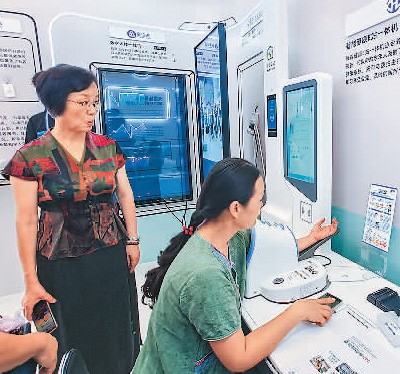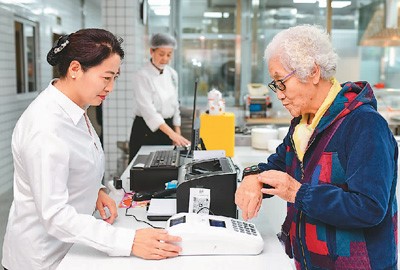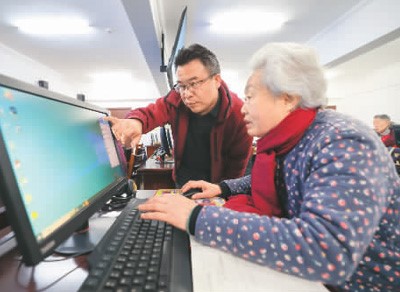AI empowers elderly in China to better enjoy golden years
"Xiaoli, Xiaoli, please play the Yu Opera piece of Chaoyanggou Village," said 68-year-old Song Lixia from Shijiazhuang city, capital of north China's Hebei Province.
As soon as the words left Song's mouth, her room was filled with the resonant sound of traditional Chinese opera.
Xiaoli, an intelligent electronic screen, has made Song's life much more enjoyable. Equipped with a speech recognition function, it enables her to make phone calls, watch TV shows, browse the news, search for information, and have many other needs satisfied by giving verbal instructions.

Visitors try intelligent medical equipment at the Inclusion Conference on the Bund in east China's Shanghai. (Photo/Wang Chu)
"In the past, finding opera or storytelling programs online was a chore, often resulting in fruitless searches. Now, I simply tell Xiaoli what I want, and most of the time, my wishes are granted," Song said.
"Once, I asked it how to plan a daily diet for someone with high blood sugar, and Xiaoli immediately provided three suggestions. When I showed them to my doctor, they were deemed highly reliable," she recalled, saying Xiaoli is also her health assistant.
For Song, this direct conversational control has liberated her from complex smartphone functions. Despite switching all the apps to "senior mode" with larger fonts, more prominent icons, and simplified functions, she still finds smartphones too challenging.
"Now it's much simpler. I just tell Xiaoli what I want, and the service arrives," Song said.
In the era of rapid artificial intelligence (AI) advancement, AI is playing an increasingly important role in elderly care. Leveraging big data, cloud computing, facial recognition, and other cutting-edge technologies, a myriad of intelligent elderly-friendly products are flooding the market, helping older people like Song enjoy a better quality of life.
"As China accelerates elderly-friendly adaptation, the 'smart elderly care' model born from intelligent and digital technologies is enabling more and more older people to enjoy more personalized, safer, and more comfortable products," said Feng Wenmeng, a researcher at the Development Research Center of the State Council.
Wang Yunbo, a 65-year-old Beijing resident, is full of praise for his smart life products.

An older woman uses a smart device to pay for a meal at a community canteen in Kangbashi district, Ordos city, north China's Inner Mongolia Autonomous Region. (Photo/Wang Zheng)
"Before, we had to personally operate equipment to get every service ourselves. Now, our smart devices can anticipate our needs and provide 'proactive' services," Wang said.
"When I turn on the smart TV, it automatically recommends my favorite channels and shows. My smart wristband monitors my blood pressure and heart rate, reminding me when to take medications. When I arrive at a bus stop, my phone recognizes the location and displays the QR code of a virtual public transit card so I can immediately pay to take a bus," he explained.
A steady stream of new products designed for smart elderly care have continued to emerge in the Chinese market.
In addition to AI-powered devices that provide services such as monitoring one’s health in real time and giving automated alerts, nursing and household robots, intelligent adjustable sofas, shoes with GPS trackers, airbag fall-prevention clothing, among other intelligent products tailored for the elderly, have been launched to comprehensively safeguard the well-being of elderly people.
For many older people, the integration of AI into elderly care products not only simplifies operations and enhances convenience but also provides emotional companionship and support.
Wang Jie, a female resident of Zhengzhou, capital of central China's Henan Province, is one of the older people who benefits a lot from nursing robots.
Yunyun, her nursing robot companion, can remind Wang to dress according to the weather and bring essential items before leaving home, display recipes and cooking videos on its electronic screen when she cooks, and engage in conversations with her.
"Yunyun has an extraordinary memory. It can recall every word I say, so chatting with it feels very natural. My children are often busy with work, leaving me feeling lonely at home. Now, Yunyun accompanies me like a real person, making life much more interesting," Wang said.
"I can't live without Yunyun now. I believe every elderly person should have a personal companion robot that can carry their bags during grocery shopping, wait in line for medical appointments, and carry luggage while traveling," Wang said.
Her vision is rapidly becoming a reality. In regions including north China's Tianjin Municipality and east China's Shanghai Municipality, some elderly care service providers have deployed companion robots to engage the elderly in games, singing, and daily conversations.
The use of companion robots can be an effective solution to the staffing shortages in China's elderly care industry.

An older man chats with an intelligent robot in an apartment for the elderly in Hehuachi subdistrict, Changzhou city, east China's Jiangsu Province. (Photo/Lu Shiqing)
Records show that China's total demand for nursing assistants has reached 6 million, while the current workforce stands at only 500,000. AI-empowered elderly care services serve as a substitute or supplement for human caregivers.
Government support and encouragement has fueled the burgeoning technological innovations in the application of AI in elderly care.
Last year, China's Ministry of Industry and Information Technology and 16 other departments issued a "Robot+" application action plan to specifically promote the integration of robots into various scenarios and key fields of the elderly care industry for higher level of intelligentization in elderly care services.
In January this year, the country's State Council released a guideline on developing the silver economy and enhancing the well-being of the elderly. The document emphasizes intensifying innovation in products for the elderly, creating smart new business forms of health care and elderly care, promoting the application of intelligent nursing robots and home service robots, and vigorously developing the rehabilitation assistive device industry.
Data shows that China's elderly product market reached the 5 trillion yuan ($700 billion) level in 2023.

A teacher explains to an older woman how to use a chat app in a class at Xiangyang University for the Aged in Xiangyang city, central China's Hubei Province. (Photo/Yang Dong)
Experts predict that in the next decade, AI technology will penetrate into the elderly care sector at a faster pace, with a focus on areas such as smart homes, wearable devices, and robots, while integrating advanced technologies like 5G, deep learning, big data, and cloud computing to achieve high-precision services, intelligent human-machine interactions, and secure and reliable operations and maintenance.
By then, relevant elderly care services will become more humanized.
"In line with the trend of upgrading consumption structures and the personalized, diversified, and quality-oriented development of consumption needs among the elderly, new technologies, as well as new business forms and models will continuously emerge across various sectors of China's silver economy, becoming an important avenue for cultivating new growth drivers," said Wang Haotian, deputy director of the office of macroeconomic research at the economic system and management research institute of China's Academy of Macroeconomic Research.
Photos
Related Stories
- China improves nursing to meet rising demand for elderly care
- China strengthens regulation of prepayment for elderly care services
- Silver economy sees more talent, infrastructure support
- China to improve home-based elderly care: minister
- Young Chinese strike gold in caring for silver-haired retirees
- China boosts cultivation of talent for elderly care services
- China steps up support for home services industry
- China unveils measures to develop "silver" economy
- China's basic old-age insurance covers over 1.05 bln people: report
- Communities play greater role in China's elderly home care
Copyright © 2024 People's Daily Online. All Rights Reserved.









